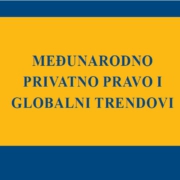Book on PIL and Global Trends (in Croatian)
Following the conference held previously this year (reported here), the book on Private International Law and Global Trends (Medunarodno privatno pravo i globalni trendovi) has been published by the Croatian Academy of Sciences and Arts (Hrvatska akademija znanosti i umjetnosti, HAZU) within the series Modernisation of Law edited by the academic and professor Jaksa Barbic.
The book includes the following contributions (all in Croatian, while the titles are translated for the convenience of the readers of this blog):
Jaksa Barbic
Editorial
Ines Medic, University of Split, Faculty of Law
Challenges of globalization of private international law for national judiciary
Ivana Kunda, University of Rijeka, Faculty of Law
Have frontier digital technologies surpassed the boundaries of private international law?
Mirela Zupan, Assoc. Prof. Dr. Paula Poretti, Jura Golub, University of J. J. Strossmayer in Osijek, Faculty of Law
Foreign public documents in the digital age
Danijela Vrbljanac, University of Rijeka, Faculty of Law
Breach of personal data in private international law
Tena Hosko, University of Zagreb, Faculty of Law
Protection of workers in private international law
Dora Zgrabljic Rotar, University of Zagreb, Faculty of Law
The effect of the Hague Judgments Convention of 2019 on the recognition and enforcement of foreign court decisions in the Republic of Croatia
The book is presented at the HAZU official webisite, while it can be bought for a symbolic price at stores such as here.

